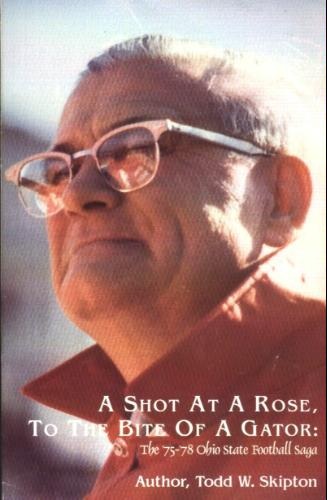In 1975 Ohio State entered the contest unbeaten and ranked #1 in the nation. There was wide speculation, if Ohio State beat their rival and captured the subsequent Rose Bowl, that Hayes would retire and go out on top of the college football world. To the outside observer, Hayes was riveted as never before. In their view, this was the biggest game of his career and the most important item in his life. They were wrong.
Joel Laser was a freshman in 1975. He was a well-regarded offensive lineman from Akron, Ohio and was recruited by every major program in the country. A tipping point in his decision to attend Ohio State came when his mother, in the final stages of a terminal illness, expressed her preference that her son be a Buckeye. Laser abided by her wish; soon thereafter she died.
If the pain of his mother’s death wasn’t challenge enough, Laser also had to cope with the well-being of his father, who slipped into a deep depression following the death of his wife. What could have been a joyous time in a young man’s life, reporting to the best team with some of the finest players in the country, devolved into a nightmare. Laser was distracted and worried and unable to play football to his high expectations during pre-season camp. Prior to the opening game of the season, Hayes gave the squad a rare day of rest. That morning, Hayes summoned Laser to his office. Hayes gave Laser the keys to his car and told the frosh to go visit his father. The trip helped, but his father’s condition failed to improve much; neither did Laser’s performance. Hayes observed from afar and didn’t say much to the struggling freshman, who sat the bench throughout the season and was a veritable nobody on this juggernaut of a team.
The Monday of Michigan week was one of the busiest, most intense and most important days of preparation. The practice was brutal and tense and Hayes was frantic in his mission to prepare his team. After practice, Laser was stunned when Hayes invited him into his office. Hayes had convened a meeting with the team physician, and the sole purpose was to determine additional ways to help Laser’s father. A plan was decided upon and Hayes made certain it was implemented. In time, Laser’s father recovered. Laser never became a star, as predicted, but he was always grateful for the help, concern, and humanitarian behavior of Hayes.
The most important consideration for Hayes was not defeating Michigan. His overriding concern was that each player, each boy that played for him, develop himself to his maximum potential on the field and in life. Winning rivalry games on the scoreboard paled in comparison to producing winners in life. Hayes raised champions; Hayes raised men.
From September 2010, http://raising-a-man.tumblr.com

 RSS Feed
RSS Feed
